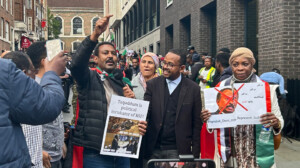Sudan inflation reaches 212.29 per cent in September
Sudanese will protest dire living conditions across the country on October 21 as the inflation rate for September is recorded at 212.29 per cent. Yesterday, the Sudanese Professionals Association (SPA) announced its support of marches being held in commemoration of the Sudanese October Revolution.
 (COHA)
(COHA)
Sudanese will protest dire living conditions across the country on October 21 as the inflation rate for September is recorded at 212.29 per cent. Yesterday, the Sudanese Professionals Association (SPA) announced its support of marches being held in commemoration of the Sudanese October Revolution.
Members of Resistance Committees and other civil society activists are conducting large-scale preparations in the capital and the states for the Marches of Millions in commemoration of the 1964 October Revolution next Wednesday.
The inflation rate for September recorded 212.29 per cent compared to 166.83 per cent in August, an increase of 45.46 per cent.
According to the monthly report issued by the Central Bureau of Statistics on Tuesday, this is due to high prices of food and drink commodities, such as bread, grains, milk, eggs, oils, fats, legumes, vegetables and sugar, and an increase in the transport and medical tariffs.
Sudan’s Central Pharmacists’ Committee warned last week of catastrophic effects due to an almost complete lack of essential, life-saving, and chronic disease drugs across the country.
In a statement on Friday, the SPA said said that the performance of the current transitional government is “troubled and weak” because quality of life in Sudan is no longer tolerable. “People spend their days searching for bread and fuel. Finding medicine has become a rarity. The same is the case with the electricity supply.”
“People spend their days searching for bread and fuel” – Sudanese Professionals Association
The group said they support the October 21 marches, and that they will not withhold any criticism of “the manipulation of the course of the revolution.”
“We support the people’s anger at the outcomes of the transitional government’s policies, and welcome calls for demonstrations on October 21 to evaluate the transitional government.”
The statement stressed that the path to peaceful democratic change is not linked to persons or governments, calling on the transitional government “to change before it is too late”.
People from Delling in South Kordofan told Radio Dabanga about a “complete absence of bread” on Friday.
Since the beginning of the week, bakeries in Delling have not received subsidised flour. Most of the people are not able to buy commercially sold bread because it is too expensive, and resort to traditional sorghum or millet alternatives instead, such as aseeda (stiff porridge made with sour dough and water) and kisra (thin flat bread).
Cost of hunger
Sudan’s newly established Social Security Commission reported in September that 77 per cent of Sudanese now live in poverty.
The Cost of Hunger in Africa (COHA) study published a report on Wednesday, which to estimates the social and economic impact of child undernutrition. The initiative is led by the National Council of Child Welfare, with support from various parties including the World Food Programme (WFP) in Sudan, the Central Bureau of Statistics (CBS), Federal Ministry of Health (FMOH), and the Central Bank of Sudan (CBoS).

In the last 5 years alone, it is estimated that 172,866 child deaths in Sudan were directly associated with undernutrition, 37.7 per cent of all child mortalities for this period.
The model estimated that 7.3 million people in Sudan are engaged in manual activities, of which 3.2 million were stunted as children. This represented an annual loss in potential income that surpasses SDG 655.9 million*, equivalent to 0.15 per cent of the GDP in potential income lost due to lower productivity.
"Sudan should put in place a comprehensive multisectoral nutrition policy, strategy and plan of action, with strong political commitment and allocation of adequate resources for its implementation across all line ministries," according to the report. This is one of nine recommendations for implementation, in order to reduce child undernutrition in Sudan by half by 2025.
Last week, the Board of Executive Directors of the World Bank group approved a grant (pre-arrears clearance) of $200 million to support the efforts of the transitional government in implementing the government programme for economic reforms, in addition to $200 million from Sudan’s partners.
* USD 1 = SDG 55.1375 at the time of publishing this article. As effective foreign exchange rates can vary in Sudan, Radio Dabanga bases all SDG currency conversions on the daily middle US Dollar rate quoted by the CBoS.
Radio Dabanga’s editorial independence means that we can continue to provide factual updates about political developments to Sudanese and international actors, educate people about how to avoid outbreaks of infectious diseases, and provide a window to the world for those in all corners of Sudan. Support Radio Dabanga for as little as €2.50, the equivalent of a cup of coffee.












 and then
and then